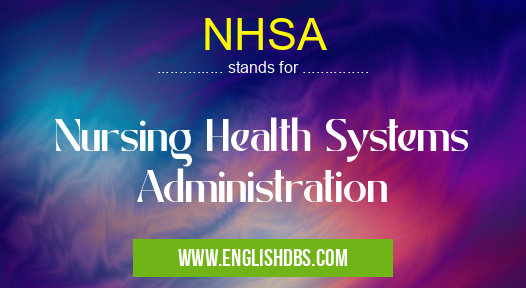What does NHSA mean in HEALTHCARE
NHSA stands for Nursing Health Systems Administration. It is a specialized field that combines nursing practice with health administration to improve the quality and efficiency of healthcare delivery.

NHSA meaning in Healthcare in Medical
NHSA mostly used in an acronym Healthcare in Category Medical that means Nursing Health Systems Administration
Shorthand: NHSA,
Full Form: Nursing Health Systems Administration
For more information of "Nursing Health Systems Administration", see the section below.
» Medical » Healthcare
Meaning of NHSA in Medical
NHSA professionals play a crucial role in the healthcare system by:
- Managing nursing departments: Overseeing the operations of nursing units, including staffing, budgeting, and quality control.
- Developing and implementing health policies: Collaborating with physicians and other healthcare professionals to establish guidelines and protocols for patient care.
- Evaluating and improving healthcare outcomes: Using data analysis and research to identify areas for improvement in patient safety, quality of care, and cost-effectiveness.
Essential Questions and Answers on Nursing Health Systems Administration in "MEDICAL»HEALTHCARE"
What is Nursing Health Systems Administration (NHSA)?
NHSA is an academic discipline that focuses on the management and administration of healthcare systems, with a particular emphasis on nursing and patient care. It equips healthcare professionals with the knowledge and skills to lead, innovate, and improve the quality of healthcare delivery.
What are the core areas of NHSA?
NHSA encompasses a broad range of topics, including:
- Healthcare policy and regulations
- Healthcare finance and budgeting
- Nursing leadership and management
- Quality improvement and patient safety
- Health information systems
- Data analytics
- Healthcare ethics
- Interdisciplinary collaboration
Who is eligible to pursue an NHSA degree?
Typically, candidates for NHSA programs hold a bachelor's degree in nursing or a related healthcare field. Some programs may also accept candidates with a bachelor's degree in a non-healthcare field, provided they have relevant work experience in healthcare.
What types of career opportunities are available for NHSA graduates?
NHSA graduates are highly sought after in various healthcare settings, including hospitals, clinics, long-term care facilities, and public health agencies. They may pursue careers as:
- Nurse executives
- Hospital administrators
- Nursing managers
- Healthcare consultants
- Health policy analysts
- Quality improvement specialists
What are the benefits of pursuing an NHSA degree?
An NHSA degree provides numerous benefits, including:
- Enhanced leadership and management skills
- In-depth understanding of healthcare systems
- Improved ability to improve patient outcomes
- Increased earning potential
- Career advancement opportunities
Final Words: NHSA is an essential field that bridges the gap between nursing and healthcare administration. By combining their clinical expertise with administrative skills, NHSA professionals contribute to the delivery of high-quality, patient-centered care while ensuring the efficient and cost-effective operation of healthcare organizations.
